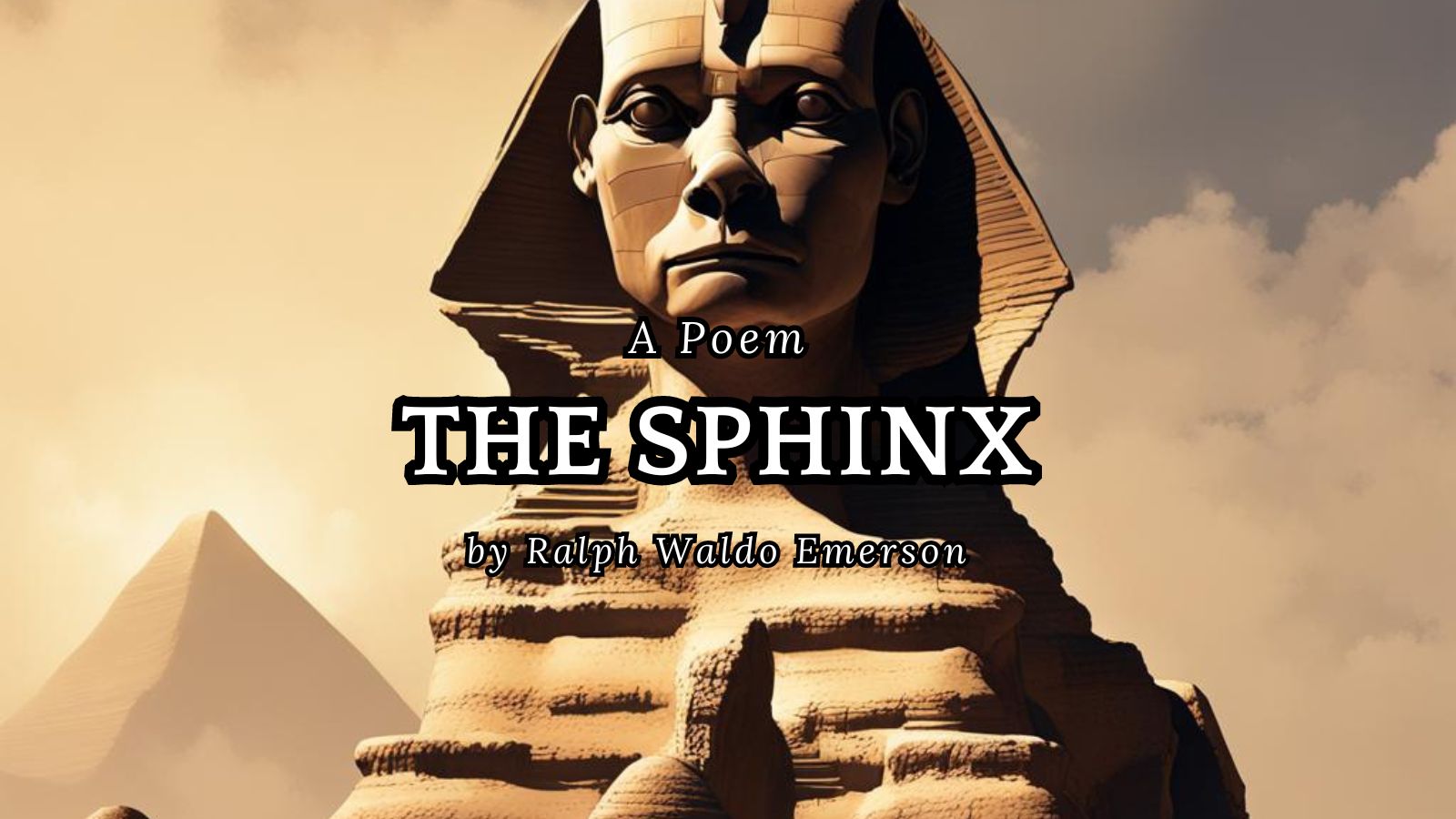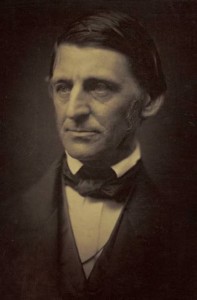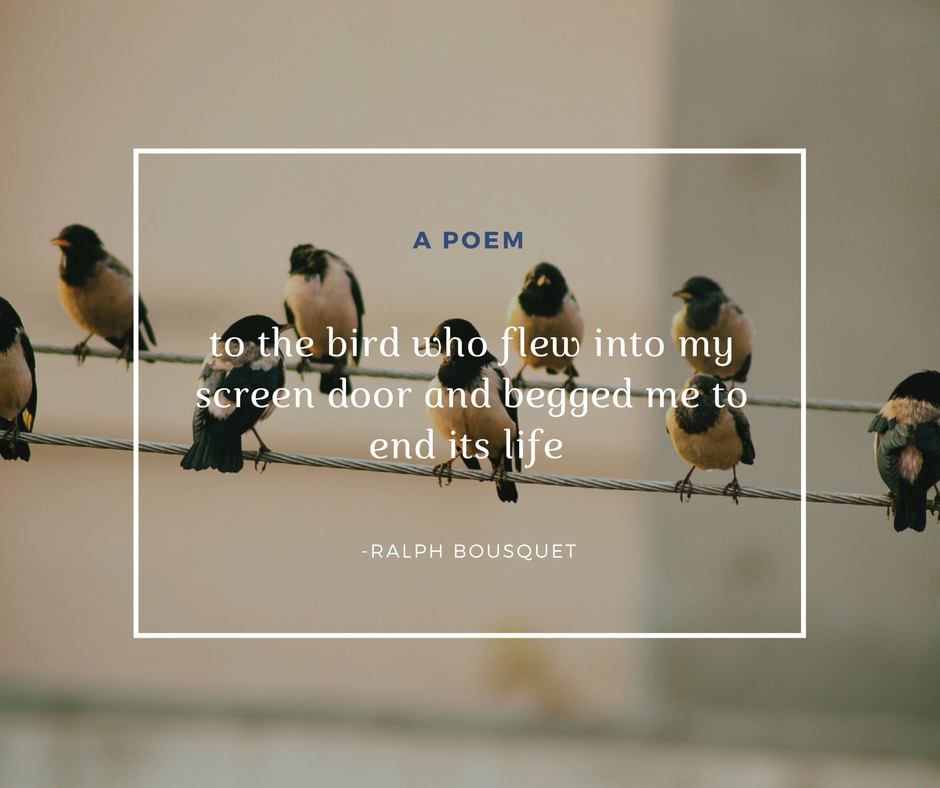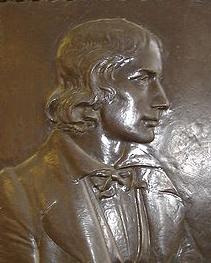The Sphinx
by Ralph Waldo Emerson
The Sphinx is drowsy,
Her wings are furled:
Her ear is heavy,
She broods on the world.
“Who’ll tell me my secret,
The ages have kept?—
I awaited the seer
While they slumbered and slept:—
“The fate of the man-child,
The meaning of man;
Known fruit of the unknown;
Daedalian plan;
Out of sleeping a waking,
Out of waking a sleep;
Life death overtaking;
Deep underneath deep?
“Erect as a sunbeam,
Upspringeth the palm;
The elephant browses,
Undaunted and calm;
In beautiful motion
The thrush plies his wings;
Kind leaves of his covert,
Your silence he sings.
“The waves, unashamèd,
In difference sweet,
Play glad with the breezes,
Old playfellows meet;
The journeying atoms,
Primordial wholes,
Firmly draw, firmly drive,
By their animate poles.
“Sea, earth, air, sound, silence.
Plant, quadruped, bird,
By one music enchanted,
One deity stirred,—
Each the other adorning,
Accompany still;
Night veileth the morning,
The vapor the hill.
“The babe by its mother
Lies bathèd in joy;
Glide its hours uncounted,—
The sun is its toy;
Shines the peace of all being,
Without cloud, in its eyes;
And the sum of the world
In soft miniature lies.
“But man crouches and blushes,
Absconds and conceals;
He creepeth and peepeth,
He palters and steals;
Infirm, melancholy,
Jealous glancing around,
An oaf, an accomplice,
He poisons the ground.
“Out spoke the great mother,
Beholding his fear;—
At the sound of her accents
Cold shuddered the sphere:—
‘Who has drugged my boy’s cup?
Who has mixed my boy’s bread?
Who, with sadness and madness,
Has turned my child’s head?'”
I heard a poet answer
Aloud and cheerfully,
‘Say on, sweet Sphinx! thy dirges
Are pleasant songs to me.
Deep love lieth under
These pictures of time;
They fade in the light of
Their meaning sublime.
“The fiend that man harries
Is love of the Best;
Yawns the pit of the Dragon,
Lit by rays from the Blest.
The Lethe of Nature
Can’t trance him again,
Whose soul sees the perfect,
Which his eyes seek in vain.
“To vision profounder,
Man’s spirit must dive;
His aye-rolling orb
At no goal will arrive;
The heavens that now draw him
With sweetness untold,
Once found,—for new heavens
He spurneth the old.
“Pride ruined the angels,
Their shame them restores;
Lurks the joy that is sweetest
In stings of remorse.
Have I a lover
Who is noble and free?—
I would he were nobler
Than to love me.
“Eterne alternation
Now follows, now flies;
And under pain, pleasure,—
Under pleasure, pain lies.
Love works at the centre,
Heart-heaving alway;
Forth speed the strong pulses
To the borders of day.
“Dull Sphinx, Jove keep thy five wits;
Thy sight is growing blear;
Rue, myrrh and cummin for the Sphinx,
Her muddy eyes to clear!”
The old Sphinx bit her thick lip,—
Said, “Who taught thee me to name?
I am thy spirit, yoke-fellow;
Of thine eye I am eyebeam.
“Thou art the unanswered question;
Couldst see thy proper eye,
Alway it asketh, asketh;
And each answer is a lie.
So take thy quest through nature,
It through thousand natures ply;
Ask on, thou clothed eternity;
Time is the false reply.”
Uprose the merry Sphinx,
And crouched no more in stone;
She melted into purple cloud,
She silvered in the moon;
She spired into a yellow flame;
She flowered in blossoms red;
She flowed into a foaming wave:
She stood Monadnoc’s head.
Thorough a thousand voices
Spoke the universal dame;
“Who telleth one of my meanings
Is master of all I am.”
Summary
The Sphinx, a mythical creature, poses philosophical questions about the mysteries of humanity and the universe that have gone unanswered over the ages. She wonders about the meaning of life, humanity’s purpose, and the secrets of nature. A poet responds optimistically, suggesting that profound love, spiritual vision, and embracing life’s dualities can provide meaning. However, the Sphinx counters that humanity is ignorant and fails to comprehend the deeper truths.
The poet argues that humanity must continuously dive deeper into the unknown, seeking new understanding rather than settling for surface truths. But the Sphinx replies that humanity can never fully grasp the infinite complexity of nature. She represents the eternal mystery at the heart of existence. After this dialogue, the Sphinx transforms into various forms in nature – cloud, moon, flame, blossoms, wave – representing the manifold variety and wisdom of the natural world, with which humanity is intertwined.
In the end, the poem explores humanity’s relationship to nature and the search for meaning through philosophical questioning. The Sphinx symbolizes the unknown, while the poet affirms love, imagination, and ceaseless searching as ways to catch glimpses of meaning. The poem suggests that although we may not find absolute answers, the quest itself brings meaning.
Bio
Ralph Waldo Emerson (1803-1882) was a renowned American essayist, lecturer, philosopher, and poet who led the transcendentalist movement in the mid-19th century. He was born in Boston, Massachusetts and attended Harvard University where he began his career as a minister before turning to writing and public speaking. Emerson became one of America’s most influential thinkers and writers, pioneering a uniquely American approach to philosophy and literature based on optimism, individualism, and harmony between humanity and nature.
Some of Emerson’s most famous essays include “Self-Reliance,” “The American Scholar,” “Nature,” and “The Poet.” He gave hundreds of popular lectures across the country on a wide range of topics such as intellectual independence, the ethics of politics, and the role of scholars in society. Emerson was associated with other transcendentalists like Henry David Thoreau and Margaret Fuller who shared his belief in the mysticism of nature and individual intuition as a source of spirituality.
In addition to his prolific essays and lectures, Emerson wrote over 1,800 poems characterized by their philosophical idealism and emphasis on moral and ethical principles. He traveled widely throughout Europe and Asia and incorporated ideas from Eastern philosophy into his writings. Emerson’s work had an immense influence on American literature, embodying the energetic optimism and individualism of the young nation. He died in 1882 after a prolific career advocating for human rights, critical thinking, and the betterment of society through self-culture.






Leave a Reply
You must be logged in to post a comment.